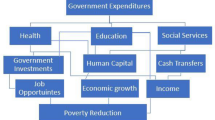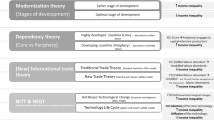Abstract
In the post-poverty eradication era, it is still important to increase the monitoring of urban and rural residents’ poverty status and succession of poverty alleviation and protection policies. Taking social capital as the entry point, this paper uses the 2018 CFPS database to study the impact of social capital on household poverty, urban–rural heterogeneity, and the moderating effect of economic development, in order to provide a policy reference for further consolidating the results of poverty eradication. The results find that social capital can significantly reduce the probability of household poverty, and the poverty reduction effect on urban households is greater than that on rural households, while the level of economic development has a significant moderating effect on the reduction of relative poverty by social capital. The higher the level of economic development, the stronger the effect of social capital on the reduction of relative poverty of households. Accordingly, this paper proposes to play a leading role of the government, tilt infrastructure resources to rural and central and western regions, cultivate public spirit of urban residents, and create a favorable social media environment to increase social capital of urban and rural households; build official employment service platforms, actively cooperate with third parties, promote information sharing, and broaden employment channels for residents; and develop the economy and make a bigger “cake” to promote the role of social capital in poverty reduction.


Similar content being viewed by others
Availability of Data and Material
Detailed information regarding this data could be obtained from the official website of China Family Panel Studies Survey data http://opendata.pku.edu.cn/dataverse/CFPS/.
Notes
The higher the score in the original questionnaire of 2018CFPS, the worse the health condition. For the convenience of the study, the order of the assigned values was changed in the data processing. In this paper, the higher the score, the better the health condition.
This paper defines single status to include unmarried, divorced, and widowed, and non-single status to include married (with a spouse), and cohabiting.
According to the classification of the National Bureau of Statistics for the East, Middle and West regions, the Eastern region: Beijing, Tianjin, Hebei, Liaoning, Shanghai, Jiangsu, Zhejiang, Fujian, Shandong, Guangdong and Hainan; the Central region: Shanxi, Jilin, Heilongjiang, Anhui, Jiangxi, Henan, Hubei and Hunan; the Western region: Sichuan, Chongqing, Guizhou, Yunnan, Tibet, Shaanxi, Gansu, Qinghai, Ningxia, Xinjiang, Guangxi and Inner Mongolia.
References
Bian, Y. (2006). Social capital research. Learning and Exploration, (02), 39–40+269.
Bian, Y., Wang, W., & Zhang, L., et al. (2012) Cross-institutional social capital and its income returns[J]. China Social Science,(02):110–126+207.
Bourdieu, P. (1986). The forms of capital [A] In J. G. Richardson (Ed.), Handbook of Theory and Research for the Sociology of Education, New York: Greenwood New York: Greenwood Press, 241–258.
Bourdieu, P. L. (1980). capital social: Notes provisoires[J]. Actes De La Recherche En Sciences Sociales, 3(1), 3–6.
Chen, L., & Yuan, Z. (2012). Is it better to teach fish than to give fish? -- Wealth capital, social capital, human capital and intergenerational income mobility in China[J]. Fudan Journal (Social Science Edition), (04):99–113+124.
Chen, Y., & Zhang, W. (2015). The impact of social capital on gender income gap in the context of marketization based on 2009 JSNet national data[J]. Society, 35(06), 178–205. https://doi.org/10.15992/j.cnki.31-1123/c.2015.06.017
Cheng, C., & Bian, Y. (2014). Social capital and the reproduction of inequality Taking the income gap between migrant workers and urban workers as an example[J]. Society, 34(04), 67–90. https://doi.org/10.15992/j.cnki.31-1123/c.2014.04.008
Cleaver, F. (2005). The inequality of social capital and the reproduction of chronic poverty [J]. World Development, 33(6), 893–906.
Coleman, J. S. (1988). Social capital in the creation of human capital. American Journal of Sociology, 94, S95–S120.
Collier, P. (2002). Social capital and poverty: A microeconomic perspective [J]. The role of social capital in development: An empirical assessment, 19–41.
He, Z. (2015). The impact of human capital, political capital, and social capital on income inequality of urban residents in China[J]. Journal of Henhai University (Philosophy and Social Science Edition), 17(04), 42–47+90–91.
Ikegami, S. (2014) An urban-rural comparison of social networks, psychological capital, and residents' health[J]. Population and Development, 20(03), 96–103+112.
Li, S., & Chen, G. (2012). Can “relationships” bring happiness? –Empirical evidence from rural China[J]. China Rural Economy, 08, 66–78.
Li, X., & Jiang, C. (2018). Rural poverty reduction: Should we pay more attention to human capital or social capital? [J]. Economic Science, 05, 68–80.
Li, X., Ye, W., & Zhu, H. (2017). Social capital and female entrepreneurship (1)-A cross-country (regional) comparative study based on GEM data[J]. Journal of Management Science, 20(08), 112–126.
Liu, Q., Sun, K., & Hu, B. (2017). Whether the impact of social capital on income levels and differences is expanding or decreasing - A sample from urban residents in 12 provinces[J]. Economic Theory and Economic Management, 07, 5–16.
Liu, Y., & Wang, R. (2017). Income disparity, social capital and residential poverty[J]. Quantitative Economic and Technical Economics Research, 34(09), 75–92.
Lu, M., & Li, S. (2008). Social capital, informal institutions and economic development. Management World,(09), 161–165+179. https://doi.org/10.19744/j.cnki.11-1235/f.2008.09.016
Lu, M., Zhang, S., & Sato, H. (2010). Can social capital still act as an insurance mechanism in the marketization process? --An empirical study of rural households' post-disaster consumption in China[J]. World Economic Journal, (01), 16–38.
Ma, H., & Chen, L. (2012). The theory of rural social capital and its analytical framework. Journal of Hebei University of Economics and Business, 33(02), 10–19.
Putnam, R. D. (1993). Making democracy work: Civic traditions in modern Italy [M]. Princeton University Press.
Shi, H., Zhao, Y., & Wu, H. (2019). Research on the impact of social capital on multidimensional poverty–Micro-survey data from 513 fallow farming households in Yan’an City, Shaanxi Province[J]. Agricultural Technology Economics, 01, 86–99.
Sun, B., & Cao, J. (2020). Social capital heterogeneity and differences in the effectiveness of rural poverty reduction-analysis based on the dual perspective of income growth and gap reduction[J]. Business Research, 01, 35–44.
Sun, Y., & Lin, W. (2013). The impact of social capital on farmers’ financing in the marketization process -Evidence from CHIPS. Agricultural Technology Economics, 04, 26–34. https://doi.org/10.13246/j.cnki.jae.2013.04.007
Wang, X., & Lu, Q. (2012). Empirical evidence on the willingness of rural communities to cooperate in the provision of small-scale water conservancy facilities[J]. China Population-Resources and Environment, 22(06), 115–119.
Wu, K., Liu, R., & Zhong, Y. (2021). A study on the two sides of social capital influencing college students’ employment: A perspective of rational choice theory[J]. Education and Economics, 37(04), 65–71.
Xie, J., & Yao, L. (2021). Social capital change and poverty vulnerability of farm households: A perspective based on the transition from “rural China” to “urban-rural China”[J]. Population and Economy, 04, 1–21.
Xie, Q. (2017). Human capital versus social capital: Who is more effective in alleviating poverty? [J]. Shanghai Economic Research, 05, 51–60. https://doi.org/10.19626/j.cnki.cn31-1163/f.2017.05.007
Xu Ge, L. U., & Qian, J. Y. (2019). Social capital, income diversification and poverty vulnerability of farm households[J]. China Population-Resources and Environment, 29(02), 123–133.
Yang, R., Chen, B., & Zhu, S. (2011). A study of farmers’ private lending demand behavior based on social network perspective[J]. Economic Research, 46(11), 116–129.
Yang, X. (1999). Social capital: An exploration of a new explanatory paradigm[J]. Marxism and Reality, 03, 51–59.
Ye, C., & Luo, L. (2011). Social capital, poverty alleviation policies and welfare of poor households: A stratified linear regression analysis based on a survey of rural households in poor areas of Guizhou[J]. Finance and Economics Science, 07, 100–109.
Ye, J., & Wu, L. (2014). Social capital and wage levels of migrant workers in cities - Resource measurement and causal identification[J]. Economics (quarterly), 13(04), 1303–1322.
Yu, F., & Zhang, Y. (2019). Outworking, social capital and intra-farm household income gap[J]. Economic and Management Studies, 40(08), 90–103.
Zhang, W. (2007). Social capital research in China: Concepts, operationalized measures, and empirical studies [J]. Jiangsu Social Science, 03, 142–149.
Zhao, M. (2021). Research on the impact of social capital on the employment of poor college students–An analysis based on the survey results of eight institutions in Jiangsu Province. Jiangsu Higher Education, 12, 123–127.
Zhao, J., & Lu, M. (2010). The contribution of relationship to rural income gap and its regional differences–A regression-based decomposition analysis. Economics (quarterly), 9(01), 363–390.
Zhao, Z., & Wang, X. (2021). Social capital and poverty return deterrence among rural elderly population: A theoretical mechanism and empirical test [J]. Journal of Central South University of Forestry Science and Technology (Social Science Edition), 15(06):67–76+91.
Zheng, X. (2009). Social capital and rural development [M]. China Social Science Press.
Zhou, Y. (2012). Is social capital the capital of the poor? –Empirical evidence based on the income of Chinese farm households. Management World, 07, 83–95.
Zhou, Y. (2013). The role of social capital in farm household income-Evidence based on the China Household Planning Survey (CHIPS2002)[J]. Economic Review, 04, 47–57.
Acknowledgements
This paper would like to thank the CFPS dataset for its availability and convenience for data analysis.
Funding
This paper is supported by National Social Science Foundation of China (21BRK042).
Author information
Authors and Affiliations
Contributions
Yichao Wu is responsible for the whole structure design, from research topic selection, literature review, data selection and reports, and writings of most section. Zhenli Guo is responsible for data analysis.
Corresponding author
Ethics declarations
Ethics Approval and Consent to Participate
The submitted manuscript utilizes secondary data of China Family Panel Studies survey (CFPS) to answer the proposed research questions. The data has obtained permission and their ethical statement has been approved. All participants in the survey have signed the ethical statement. Detailed information regarding this data could be obtained from the official website of China Family Panel Studies Survey data http://opendata.pku.edu.cn/dataverse/CFPS.
Consent for Publication
The dataset being used in this paper has obtained permission and their ethical statement has been approved. We’ve got consent to publish this paper.
Competing Interests
The authors declare no interests.
Additional information
Publisher's Note
Springer Nature remains neutral with regard to jurisdictional claims in published maps and institutional affiliations.
Rights and permissions
Springer Nature or its licensor (e.g. a society or other partner) holds exclusive rights to this article under a publishing agreement with the author(s) or other rightsholder(s); author self-archiving of the accepted manuscript version of this article is solely governed by the terms of such publishing agreement and applicable law.
About this article
Cite this article
Wu, Y., Guo, Z. Analysis of the Effect of Social Capital on Household Poverty: Evidence from 2018 CFPS. Glob Soc Welf (2023). https://doi.org/10.1007/s40609-023-00269-8
Accepted:
Published:
DOI: https://doi.org/10.1007/s40609-023-00269-8




